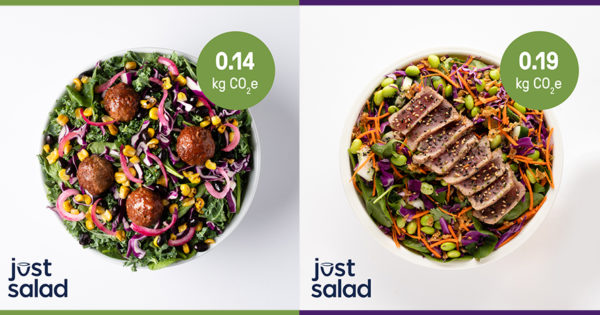
Just in time for World Environment Day today, sustainably-minded restaurant chain Just Salad announced a new addition to its menu: Carbon labels.
Alongside the calorie count for each of the restaurant’s salads, warm bowls, wraps, soups, smoothies and avocado toasts, the menu will list the estimated emissions created by the production of the foods within that item. For example, a Tokyo Supergreens salad clocks in at 0.21 kilograms of CO2. A quarter-pound hamburger patty, in contrast, is about 3.75 kilograms.
The idea is to try to shift the way that people think about the food we eat. It’s not just about the calorie count or the nutritional value—it’s also about its cost to the planet.
“The vision is that people will look at and interpret CO2 labels in a similar way to how they look at other nutritional information,” said Sandra Noonan, Just Salad’s chief sustainability officer. “The potential to combat climate change through one’s diet is enormous.”
Improving sustainability through waste minimization is something that’s been a part of Just Salad’s mission from the beginning—the company pioneered a reusable bowl program that its had in place since its founding in 2006. It’s also committed to ensuring that its nearly 50 restaurants are sending little or no waste to landfills by 2022.
In addition to these efforts, Noonan said that the company wanted to find ways to address climate change more directly. That led her to think about the role that food production plays in climate change, and what minimizing the emissions created by the food industry might look like.
More than a quarter of global carbon emissions—26%—comes from food production, said Noonan. And while there are things that must happen at all levels to lower the industry’s overall emissions, carbon labeling is a way for consumers to be informed about the impact of their choices. Just Salad will be the first restaurant chain to add CO2 emissions to its menu, which will roll out across all its locations by Climate Week this fall, which begins Sept. 21.
Right now, the diet of each American on average produces 4.7 kilograms of carbon emissions every single day, said Noonan. That number would have to fall to 2.5 kilograms for the country to meet emissions reductions targets, according to the researchers and universities that Just Salad worked with to develop their carbon labeling.
“It’s a very interesting way to think about what level we’re at with carbon emissions and how plant-based foods stack up against that that line,” said Noonan. She noted that while some of the emissions costs are intuitive—plant-based meat alternatives score better than meat does, for example—some are more unexpected.
“A salad with a yogurt dressing has a much heavier carbon footprint than a salad that might have a little bit of chicken,” said Noonan, which might contradict assumptions related to the carbon emissions related to meat production. Dairy carries a significant cost, as well, and the dressing can play a big role in the tally of the overall salad.
Carbon labeling can also serve as a small way for consumers to make daily decisions with the planet in mind. Based on surveys, Noonan said 51% of Americans feel helpless in the face of climate change.
In January, Just Salad revealed it would likely seek either private equity or an initial public offering to fund growth, as consumer demand continues to propel the need for more restaurants.
https://www.adweek.com/brand-marketing/just-salad-to-become-the-first-restaurant-to-add-carbon-labeling-to-its-menu/

